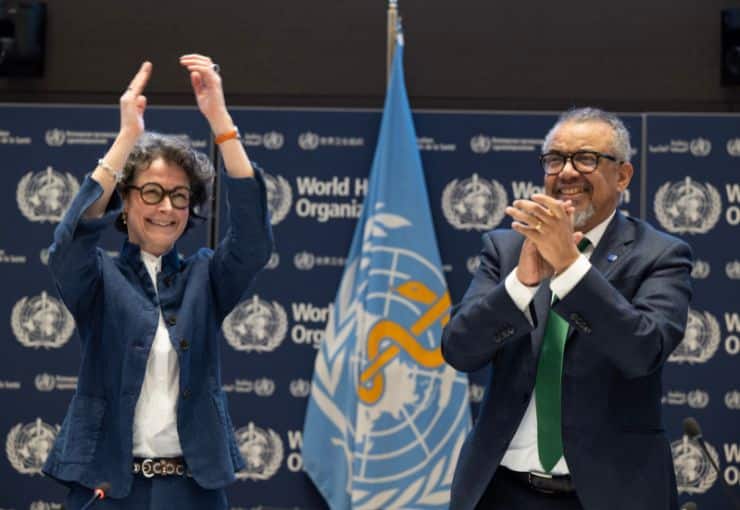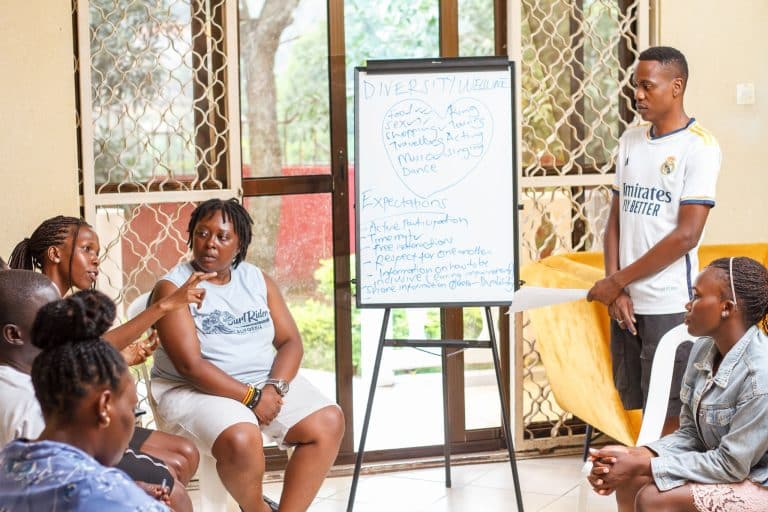If you had to wait twelve hours to pay a visit to your physician, would you return the next time? Or if a midwife yelled at you during labour, or your prescription drugs were never available at your local pharmacy? In the African health sector, these scenarios are not uncommon. We talked about health care in Africa with the Nigerian PhD student Oluwasegun Jko Ogundele, who paid a visit to Wemos earlier this month.
‘It is easy to blame people for visiting traditional healers instead of the modern health clinic,’ said Jko, who is currently doing research on inequities in access to sexual and reproductive healthcare towards the achievement of Universal Health Coverage in Africa. Women want to use modern methods to delay or prevent pregnancies, but the problem is the absence or inconsistent availability of quality services that meet their needs.
Access to good quality reproductive health care services can be life-saving and improve health for couples, women in labour, mothers who need post-natal care and infants. But it also determines other aspects of the quality of life: if a young girl can finish school before getting pregnant, or if she will be able to start family planning as an adult and have a career. Access to contraceptives, from female condoms to IUDs to oral contraceptives, gives women the opportunity to plan pregnancies, and most importantly, plan their lives while increasing their chances of being gainfully employed.
Health as a status
Jko believes that a focus on sexual reproductive health and rights (SRHR) can have positive spin-offs for the health system overall, particularly for primary health care facilities. These can fill the gap for the need for family planning, maternal and child care. ‘When the facilities are there, women can say: ‘I want children, but not in the next two or three years.’ Women want to space births,’ Jko says. But facilities are either unavailable, or care is of poor quality and unaffordable. ‘All women will access family planning services, but the type of family planning accessed will vary with how wealthy she is. For example, less wealthy women will access family planning services which could be modern or traditional methods.’
The same counts for skilled birth attendants: if they are available for patients, and provide good services, then patients will return. Jko also points to the influence of socio-economic status. Regardless of what class they belong to in society, women want to have safe deliveries and have healthy babies. ‘They want to have what the upper-class has. In rural areas, it is understandable that women may seek the services of the traditional birth attendants because they are familiar and perceived as knowledgeable. However, Jko adds that if they had access to a skilled birth attendant, then they would probably seek those services as well.
‘People know that the times have changed: if it is accessible, affordable and of good quality, people will come and get it’. But despite this awareness, one main challenge remains to achieving access to good quality and affordable health care: a lack of health workers and finances. Patients will not return to a clinic or advise their social network to, if their prior experiences were unfavorable. Think of long waiting hours, absent staff or (medical) products, or unexpected out-of-pocket payments – which sometimes constitute a financial burden that drives a household into poverty.
Lack of funding and overburdened health workers
When asked about the role of health professionals in SRHR, Jko is clear about the importance of financing human resources for health. ‘Nobody wants to be a nurse because they are not well-paid and are overburdened.’ To earn an income in the face of unpaid salaries, doctors often also set up private practices, but this puts more pressure on (cheaper) public facilities by taking away their limited workforce. Public facilities are underfunded, understaffed and overburdened with patients, who then have to endure long waiting hours. This drains the motivation for patients to access health care, and for health workers to provide quality care. From Jko’s understanding, travel distances and associated costs, coupled with sparsely available services, are also reasons why people still visit alternative healthcare providers. When asked where people would go to if the traditional healer was right next to a well-equipped family health clinic with available staff, Jko laughs. ‘People will try both, but will figure out soon enough which one works best for birth control, for example.’
A woman’s need for access to reproductive health services should not be a trade-off for her family’s next meal
Universal Health Coverage
To successfully tackle these issues, Jko says more financial resources for the health system are needed. National policies should be equitable and pro-poor: a woman’s need for access to reproductive health services should not be a trade-off for her family’s next meal. ‘Not to be repetitive, but national corruption must also be dealt with through adequate monitoring, and evaluation is needed for improvements. There is no denying that funds have to be strategically allocated and ensure that policies that protect the poor are implemented. Right now, funding does not get to where it’s needed or who needs it.’ He also mentions taxes, and hints at Universal Health Coverage: ‘There should be an improved national progressive taxation system as well as sin taxes on unhealthy products, like tobacco and alcohol. Though corporations need to be taxed too. Only when there is one big pool of funds in the country can inequities be best addressed through well-thought-out reforms.’




